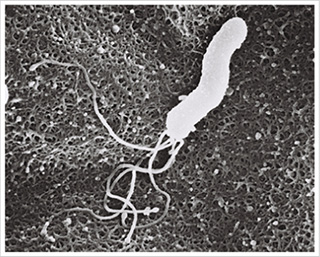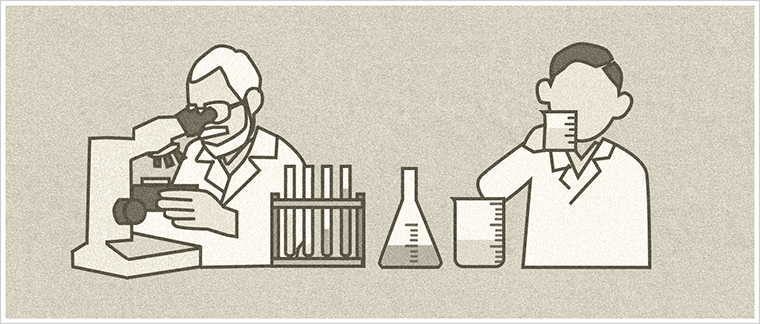About H. pylori
The full name of H. pylori, a type of bacteria is Helicobacter pylori.
"Helico" refers to the bacterium's helix, or twisted spiral, shape. The word "helicopter" is also derived from "helico.", and like a helicopter, the bacterium's flagella (whip-like appendages) twist to make H. pylori move. "Bacter" means bacteria. "Pylori" refers to the exit from the stomach, which is called the pylorus, and it was here that H. pylori was first discovered. H. pylori's biggest feature is that it grows in conditions without oxygen, and when exposed to oxygen it gradually dies off. H. pylori is also vulnerable to dry conditions, and is classified as a gram-negative bacillus.
H. pylori bacterium are 0.5 × 2.5 to 4.0 µm in size and have a few flagella that they use to move around in the stomach.
H. pylori can live in the strongly acidic environment of the stomach by moderating the acid around their own bodies. They do this by breaking down urea into carbon dioxide and ammonia, which neutralizes the acid.


The characteristics and secrets of H. pylori
The official name of H. pylori is Helicobacter pylori. "Helico" refers to the bacterium's helix, or twisted spiral, shape. H. pylori have a few flagella that they use to move around in the stomach.
The history of the discovery of H. pylori
In 2005, Robin Warren, Emeritus Professor, and Barry Marshall, Professor, both of the University of Western Australia, won the Nobel Prize in Physiology or Medicine for the discovery of Helicobacter pylori (H. pylori).
Warren, who at the time of the discovery was a pathologist at Royal Perth Hospital, discovered a small, bent, unknown bacterium (H. pylori) in the mucous membrane of the stomachs of gastritis patients. Later, in joint research with Marshall, who was a gastroenterology resident, they investigated tissue from 100 patients and confirmed the presence of H. pylori in nearly all of the patients suffering from gastritis and stomach and duodenal ulcers.
Then, following some trial and error, they successfully isolated and cultured H. pylori in 1982. Marshall became known for verifying that H. pylori causes acute gastritis by imbibing the bacterium himself in an experiment.
Until then it was thought that stress and lifestyle were the main causes of peptic ulcers. But now it has become clear that an H. pylori infection triggers gastritis and stomach and duodenal ulcers. This discovery led to H. pylori eradication therapy and brought about a revolution in the treatment of recurrent stomach and duodenal ulcers.

H. pylori infections

The infection rate for H. pylori correlates with hygiene, and it is said that more than 70-80% of Japanese aged 50 or older are infected with it. However, the infection rate has dropped rapidly among the younger generation, thanks to the improvement in sanitary conditions. Infants can also become infected through oral transmission from family members and others close to them.






